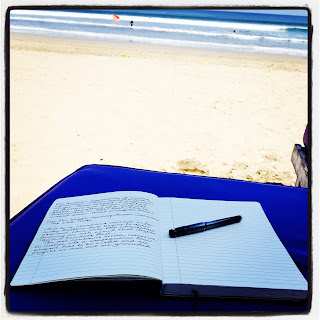Where Do You Write?
In my many conversations with teachers, the subject often turns to writing beyond the classroom. I urge both the teachers and their young writers to write beyond those four walls. -Write around the school, and weather permitting occasionally write outside of the classroom. Write at home.
Make a conscious effort to write somewhere else, somewhere different and see what it brings to your writing experience. Taking the time to write in a different location allows a broader range of sensory elements to influence your mind, your writing.
Consider your notebook as a travelling companion. Tuck it under your arm and write in wild, unfamiliar spaces. Actively challenge the notion that writing is something we just do at school. Make it a form of portable magic, just like reading. Let's re-imagine writing as a free-range activity!
Some writers need a special place to write. They can only write in that space, that particular location -by the sea, in the mountains, in a cottage beside a lake. I am fortunately not limited in that way.
Some writers need absolute quiet, even the ticking of a clock becomes a distraction.
I am lucky. I have many special places to write. I can plonk myself down pretty much anywhere and write. The beach, the park, the airport, a cafe, or leaning against a tree are all places I have found myself at one with the harvesting of words.
I once read that American author, Thomas Wolfe wrote standing up in his kitchen. Wolf, a rather tall man chose to write on the top of his refrigerator apparently. It suggests the wrong place to write is a place in which you don’t feel comfortable.
When a writer feels comfortable the words are more likely to flow. Let’s face it, if you really want to write, you will keep searching until you find a space that suits you.








Comments
Post a Comment